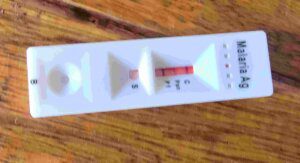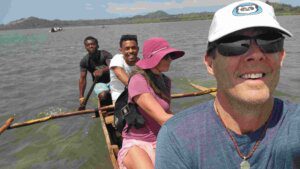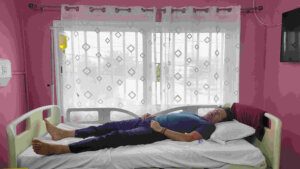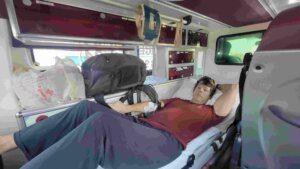Our story is a cautionary tale of how powerful and deadly malaria really is. All it takes is just one mosquito bite and left untended, what can happen and did happen to us. In addition, we got an opportunity to evaluate two emergency medical systems. One in rural Senegal, which is one of the poorest countries in the world and one in urban Spain. You will never believe which one came out on top time and time again!
How it all started…
This is the route that we took during this 3 month trip through 18 countries in Africa.
As some of you may know, our goal is to travel to every country in the world. Some countries like Sri Lanka, South Africa and Italy (just to name a few) we have traveled through and experienced for extended periods of time. Other countries we not only spend months in, but we also return to at least annually. Several of these include Thailand, Indonesia and the Maldives.
And then there are countries where we don’t spend as much time, say 3 to 5 days. A few of these shorter stays were during this trip.
Malaria- It is Cyclical

Malawi is one of our favorite countries in the world! We spent a magical 10 days here and covered a lot of ground. However some of that time, Rob spent in bed feeling pretty crappy. Fever, chills, incredible fatigue, lack of appetite and some fever. I immediately thought malaria, however lost that argument.

About 4 days later he started feeling better and we were off to Nosy Be. Rob was feeling OK one day and crappy the next. No fever, but night sweats and fatigue continued. Paddling to Lokobe Nature Preserve wiped him out and walking through it was super hard on his system. Barely holding on, we got back to the hotel to a fabulous sunset, but even that didn’t make him feel better. A few more days of recuperation and we were off to Burundi.
Rob was clearly feeling better, not 100%, but better. That is malaria, it is cyclical and symptoms usually show up between 7 and 10 days after getting bitten by an infected mosquito. However, in rare cases, it can take a long time for the parasite to rear it’s ugly head .
Some types of malaria, like P. vivax and P. ovale, can come back later – it’s like the malaria parasite hides in your liver for a while (up to a year or more!) and then wakes up and makes you sick again. That’s called relapsing malaria. It’s important to remember that even if you feel fine after getting bitten, you could still get sick later. Therefore it’s best to talk to a doctor and get tested if you think you might have been exposed.
Re-Infected or Relapse?
Rob continued to feel OK throughout many of the other countries. His appetite was off, but other than that we were transitioning according to our original plan. Our flight from Guinea-Bissau to Cape Verde was delayed for 12 hours. Apparently Air Senegal had to fly a technician in to fix a minor issue. We were crammed in the only room of the Guinea-Bissau airport for that whole time with a lot of people, limited food and water. This is when we both started to feel ill.
By the time that we arrived in Praia we both felt off, classic cold symptoms and after 2 days, I was fine. However, on the day of our flight back to Dakar Rob had a fever, chills, a headache and the worst fatigue. So did the malaria parasite get triggered out of the liver and rear it’s ugly head or did Rob get re-infected? We do not know.
Comparing Healthcare Systems

Senegal Private Urgent Care
Our Air Senegal flight kept on being delayed in Praia and we arrived at the hotel 30 minutes from the Dakar Airport (DSS) in the middle of the night. There, Rob continued to sleep for the next 36 hours refusing care. In his mind, he just had a cold and all he needed was some sleep. I finally asked the hotel to call a doctor and for a malaria kit.
An ambulance arrived with an English speaking doctor, nurse and their crew. The malaria kit immediately confirmed my suspicions. Rob was rushed to the Urgent Care unit 30 minutes south in Suli, Senegal. We were given a large private room with a window and a couch for me, Here we spent the next 3 nights/4 days with round the clock care.
Rob was tested and retested. His original malaria parasite count was off the charts! He was given continuous care with round the clock intravenous medications to stamp out the parasites. Finally on day 4 his count was almost non-existent and we discharged. Still feeling very weak, Rob recuperated in gorgeous Popenguine.
The cost for these 4 days (of gold standard care and medications) was $1,000 USD, all in. Obviously we were expecting a much higher price tag. Even my malaria test (which was negative) only cost $8 USD.
Barcelona Urgent Care
One day in Barcelona Rob had a bad sleep and started feeling some of the old symptoms again. It was a Sunday and our only option was to go to emergency of the biggest hospital in Barcelona. We were processed in the hospital and sent to the waiting area. This was a tiny room with dozens of people. Only would-be patients were allowed to sit on a chair. The caregivers were lucky to get a spot on the floor, or had to stand.
Gruffly, we were told that the wait will be 6-8 hours, if we were lucky. The patient was not allowed to leave this small room. If they did, they would forfeit their position in line. There were 56 patients ahead of us. Many were crying or moaning in pain.
The wait at this urgent care was over 8 hours. We were seen by a doctor at about hour 9 and blood was drawn then. Although not very familiar with malaria, these doctors did speak to the infectious diseases doc on the phone and were told what to do. In addition to our original wait, Rob was not allowed to leave the hospital until the test results came back. 3 hours later, we thankfully received the negative malaria test.
The cost for just the malaria test in this urgent care was $310 USD.
Wrap Up

Bottom, line, given that there are only 3 countries in Africa that are truly malaria free (Algeria, Mauritius and Morocco), we had many opportunities to get sick here. Somehow and thankfully I did not. However Rob’s experience has altered our thinking. Originally we thought that if we get malaria we will take the 3 day medication and get better. Now we will be taking Malarone prior to landing in Africa or other malaria prone areas.
We are eternally gratefully to the doctors and nurses in the Suli Urgent Care that helped Rob get better. The primary physician who was assigned to the case is still in contact with us, following up to make sure that Rob is OK. We were not expecting this type of level of care from rural Africa. And we were not expecting such a disappointing level of care from urban Spain.
There are so many lessons learned from our travel story! So how to prevent malaria while traveling? Our future Africa travel itineraries will definitely include malarone, as well as the precautions which we were already taking – Deet, mosquito nets and being covered up as much as possible. Getting tested frequently while in malaria zones is something else that we will be doing at least twice a month.
Do you have a travel story where you have had to overcome medical issues? We would love to hear from you so that we can learn from each other’s experiences!

